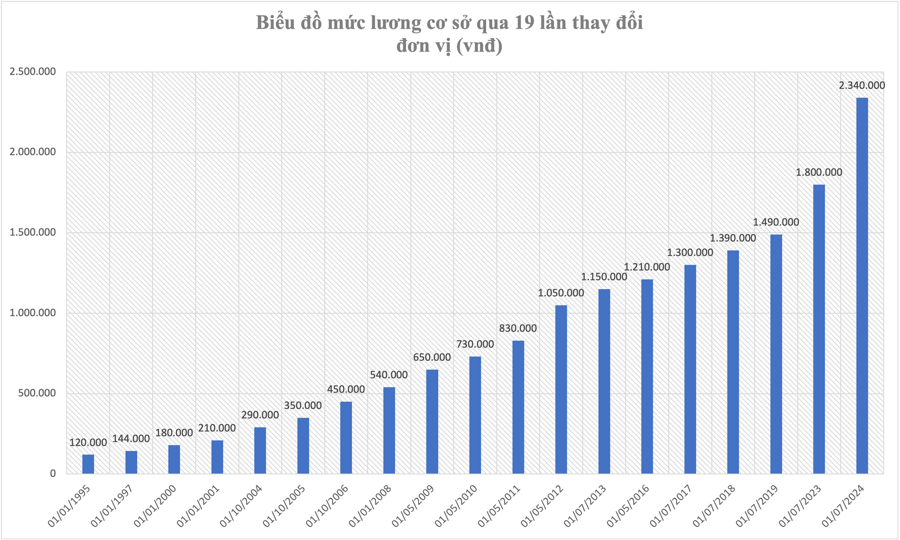According to the latest report by the Ministry of Finance, one of the concerns about inflationary pressure towards the end of the year is the change in the base salary increase. For many years, the base salary has been consistently raised to keep up with socio-economic development and the living standards of officials, public servants, and employees.
However, in 2024, there was a record increase of 540,000 VND per month, equivalent to a 30% increase, due to the impact of the pandemic, which prevented the implementation of salary reform policies in previous years.

Looking back at the price management and governance in the first six months, the Ministry of Finance stated that from the beginning of the year, the Government, the Prime Minister, and the Deputy Prime Minister – Head of the Steering Committee for Price Management and Governance have directed ministries, sectors, and localities to vigorously implement multiple solutions.
Notably, ensuring the smooth supply, circulation, and distribution of goods and services, especially for strategic commodities; focusing on strengthening price management and governance during the Lunar New Year holiday; and preparing in advance the plan for managing and governing the prices of commodities and public services with market-based roadmaps.
At the same time, the monetary policy has been proactively, flexibly, timely, and effectively governed; tax, fee, and charge support policies have continued to be implemented to assist people and businesses; and market supply and demand dynamics and price movements of essential commodities have been closely monitored to facilitate appropriate governance measures.
Regarding the first half of the year, the Ministry of Finance observed that the price level of commodities followed the annual trend, increasing during the Lunar New Year holiday and gradually decreasing in the following months, remaining relatively stable.
“In March, the shopping demand of people decreased after the holiday, and the favorable weather for agricultural production and abundant supply of vegetables and fruits caused the price level to drop.”
Report of the Ministry of Finance
In April and May 2024, the price level remained relatively stable, with the CPI increasing slightly by 0.05-0.07% compared to the previous month, mainly due to factors such as hot weather affecting the local supply of vegetables and increasing the demand for electricity, water, and cold drinks, as well as shopping for home appliances, which led to a slight increase in the prices of these groups.
On the contrary, domestic gasoline prices have been on a downward trend since the end of April, contributing to easing the pressure on the price level.
Thanks to these efforts and coordination in price management and governance, the average CPI in the first six months of 2024 increased by 4.03% compared to the same period last year.
To stabilize the market prices from now until the end of the year, especially in light of the information about the salary reform policy and in line with the implementation of the Government’s Dispatch No. 61/CD-TTg dated June 22, 2024, on strengthening measures to manage and govern prices to ensure inflation control and macroeconomic stability, the Ministry of Finance, as the standing agency of the Steering Committee for Price Management and Governance, will continue to coordinate with ministries and sectors to advise the Prime Minister and Deputy Prime Minister – Head of the Steering Committee for Price Management and Governance on solutions and measures to proactively address challenges.
This will help ensure inflation control in line with the set target, price stabilization, and macroeconomic stability. The Ministry of Finance emphasizes the following six solutions:
First, closely monitor market price fluctuations, especially for commodities that continue to experience price increases. Based on this monitoring, advise on policies and scenarios for flexible and timely price governance, especially for essential goods and services that significantly impact the overall price level.
In particular, govern the monetary policy in coordination with fiscal policy and other policies to contribute to macroeconomic stability and inflation control, ensuring the major balances of the economy.
Second, ministries, sectors, and localities should proactively prepare plans for governing the prices of commodities with state-regulated prices, carefully evaluating the impact to make adjustments within their competence or submit them to the competent authority for consideration and decision on the appropriate level of adjustment according to market price movements.
Pay close attention to the dynamics of the global economy and inflation and their impact on Vietnam to develop appropriate response solutions. Use tools and measures to regulate prices flexibly and effectively, as stipulated by the Law on Prices.
“Stay updated on domestic supply and demand dynamics to provide timely guidance on local reserves, ensuring a balance between supply and demand, and preventing shortages, hoarding, speculation, and unreasonable price increases,” the Ministry of Finance noted.
Third, for commodities and public services with market-based roadmaps, such as electricity, healthcare, and education services, the Ministry of Finance will continue to closely monitor the plans, roadmaps, and proposals developed by other ministries. This information will be used to update the inflation scenario as a basis for advising the Government, Prime Minister, and Head of the Steering Committee for Price Management and Governance on price management and governance, ensuring that the average inflation rate for 2024 remains within the target range of 4-4.5% set by the National Assembly.
Fourth, regarding gasoline and oil prices, the Ministry of Finance will continue to coordinate closely with the Ministry of Industry and Trade to govern prices according to regulations, closely monitor global price movements, and actively contribute to the improvement of the gasoline and oil price management mechanism.
Fifth, strengthen the effective implementation and supervision of measures related to price declaration and listing, and promote transparency in price-related information. Conduct inspections and examinations of compliance with price-related laws and regulations, promptly detect and rectify limitations and shortcomings, and strictly handle violations.
Sixth, continue to prioritize communication, transparency, and honesty in providing information about prices to control inflation expectations and prevent misinformation that may cause confusion among consumers and market instability.
Propose adding a bad scenario script to “shock” the economy
In addition to the positive economic growth scenarios for 2024, Vietnam needs to prepare for negative scenarios to enhance its ability to cope with unexpected shocks.
Fighting Cross-Ownership: Impossible to “Take Tangibles to Treat Intangibles”
The recent amendment to the Credit Institutions Act, passed by the National Assembly during an extraordinary session, has introduced several measures to address cross-ownership, manipulation, and domination of credit institutions. However, it is challenging to “make the intangible tangible”! To prevent cross-ownership, it is crucial to enhance the effectiveness of inspections and supervision.




















